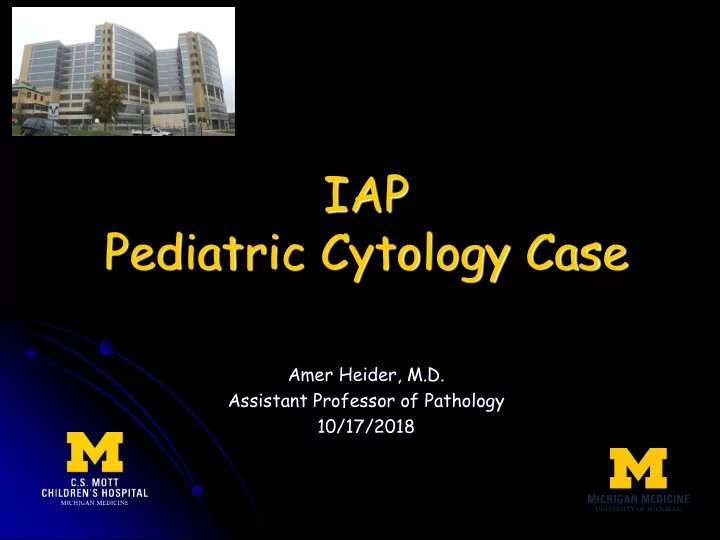

IAP Pediatric Cytology Case Amer Heider, M.D. Assistant Professor of Pathology 10/17/2018
1. Infancy: Birth - 2 years of age 2. Childhood: 2 - 12 years 3. Adolescence: 12 -21 years early 11 – 14 yrs middle 15 – 17 yrs Late 18 – 21 yrs • Hardin AP, Hackell JM. Age Limit of Pediatrics. Committee on Practice on Ambulatory Medicine. Pediatrics Sep 2017, 140 • Hagan JF Jr, Shaw JS, Duncan P, eds. Bright Futures: Guidelines for the Health Supervision of Infants, Children, and Adolescents. 3rd ed. American Academy of Pediatrics; 2008
Fine Needle Aspiration (FNA) Thyroid nodules Salivary glands/head and neck; older patients Superficial, clinically benign lesions Pancreatic lesions Recurrent tumors
9 year-old boy with parotid cyst
DOG.1 P63
Mammaglobin S-100
Secretory Carcinoma (MASC) First described in salivary gland in 2010; mainly in adult patients Resemble mammary secretory carcinoma Recurrent translocation t(12;15)(p13;q25) ETV6-NTRK3 gene fusion Low grade malignancy
Baloch Z., Field A.S., Katabi N., Wenig B.M. (2018) The Milan System for Reporting Salivary Gland Cytopathology. In: Faquin W. et al. (eds) The Milan System for Reporting Salivary Gland Cytopathology. Springer, Cham
Milan System Risk of Malignancy Baloch Z., Field A.S., Katabi N., Wenig B.M. (2018) The Milan System for Reporting Salivary Gland Cytopathology. In: Faquin W. et al. (eds) The Milan System for Reporting Salivary Gland Cytopathology. Springer, Cham
Pediatric Salivary Gland Tumors
PLAG1 and HMGA2 gene rearrangements
MAML2 gene rearrangement Mostly t(11;19)(q21;p13)
Take Home Points Pleomorphic adenoma most common neoplasm; cellular Mucoepidermoid carcinoma, most common malignancy Secretory Carcinoma (MASC); increasing incidence? FISH and molecular testing helpful
Fixed Brain!
www.google.com/images; accessed on 06/17/2018
FNA, Thyroid Most common FNA specimen in peds Nodules in children harbor higher risk of malignancy compared to adults Syndromic Association Thyroid Bethesda Reporting System
12 year-old girl with right thyroid nodule
Francis GL, Waguespack SG, Bauer AJ, et al. Management Guidelines for Children with Thyroid Nodules and Differentiated Thyroid Cancer. The American Thyroid Association Guidelines Task Force on Pediatric Thyroid Cancer. THYROID Volume 25, Number 7, 2015
Recommended subclassification of the atypia: (i) Cytologic atypia: Focal nuclear changes, extensive but mild nuclear changes, atypical cyst lining cells (ii) Architectural atypia: comprised mostly of microfollicles (iii) Cytologic and architectural atypia. (iv) Hurthle cell AUS/FLUS: Sparsely cellular but exclusively Hurthle cell; or moderately or markedly cellular sample composed exclusively (or almost exclusively) of Hurthle cells, if the clinical setting suggests a benign Hurthle cell nodule, such as in chronic lymphocytic (Hashimoto) thyroiditis or a multinodular goiter (v) Atypia, not otherwise specified Cibas ES, Ali SZ. The 2017 Bethesda System for Reporting Thyroid Cytopathology. Thyroid. 2017 Nov;27(11):1341-1346.
Cibas ES, Ali SZ. The 2017 Bethesda System for Reporting Thyroid Cytopathology. Thyroid. 2017 Nov;27(11):1341-1346. “28% of AUS/FLUS lesions and 58% of suggestive of follicular or Hurthle cell neoplasm are malignant”
Arnold SJ et al. Pediatric Thyroid Fine Needle Aspiration: Experience of a Tertiary Care Referral Center. Manuscript under review
Take Home Points Thyroid most common FNA sample in children Thyroid nodules harbor higher risk of malignancy in children compared to adults (20-22% VS 5%) Atypia of undetermined significance TBRS category in pediatric patient has increased incidence of malignancy
Conclusion and Summary Pediatric cytopathology, especially FNA is evolving field, efficient, and quick Achievement of its full potential? Not yet.. Adequacy, experience, child maturity level and need for sedation, availability of cores, need for COG protocols Understanding limitation for this diagnostic tool is essential for both pathologists and clinicians Cytpathology experience is important in pediatric practice; especially with the age cut off change and stand alone children’s hospitals
Thank You!
References Hardin AP, Hackell JM. Age Limit of Pediatrics. Committee on Practice on Ambulatory Medicine. Pediatrics Sep 2017, 140 (3) e20172151; DOI: 10.1542/peds.2017-2151 US Department of Health and Human Services; Food and Drug Administration. Guidance for Industry and FDA Staff: Pediatric Expertise for Advisory Panels. www.fda.gov/downloads/MedicalDevices/DeviceRegulationandGuidance/GuidanceDocuments/ucm082188.pdf ; last accessed online on 05/12/2018 Hagan JF Jr, Shaw JS, Duncan P, eds. Bright Futures: Guidelines for the Health Supervision of Infants, Children, and Adolescents. 3rd ed. Elk Grove Village, IL: American Academy of Pediatrics; 2008 Cibas ES, Ducatman BS. Cytology: Diagnostic principles and clinical correlates. 4 th Ed., 2014. Baloch Z., Field A.S., Katabi N., Wenig B.M. (2018) The Milan System for Reporting Salivary Gland Cytopathology. In: Faquin W. et al. (eds) The Milan System for Reporting Salivary Gland Cytopathology. Springer, Cham Rossi ED, Faquin WC, Baloch Z, et al. The Milan System for Reporting Salivary Gland Cytopathology: Analysis and suggestions of initial survey. Cancer Cytopathol. 2017 Oct;125(10):757-766. El-Naggar AK, Chan J KC, Grandis JR, Takata T, Slootweg, PJ. WHO Classification of Head and Neck Tumours. International Agency for Research on Cancer (IARC) Press, Lyon (2017),pp 163-186. Monaco SE, Teot LA. Pediatric Cytopathology a practical guide. 2017 Springer-Verlag Berlin Heidelberg. Cibas ES, Ali SZ. The 2017 Bethesda System for Reporting Thyroid Cytopathology. Thyroid. 2017 Nov;27(11):1341-1346. Francis GL, Waguespack SG, Bauer AJ, et al. Management Guidelines for Children with Thyroid Nodules and Differentiated Thyroid Cancer. The American Thyroid Association Guidelines Task Force on Pediatric Thyroid Cancer. THYROID Volume 25, Number 7, 2015
Recommend
More recommend